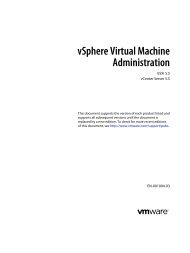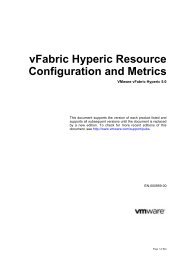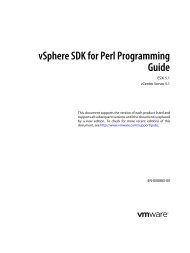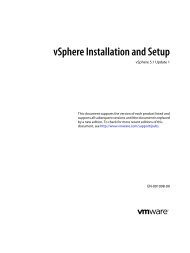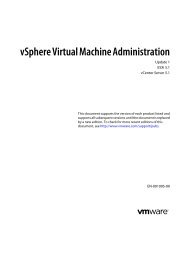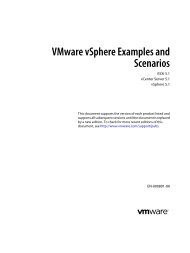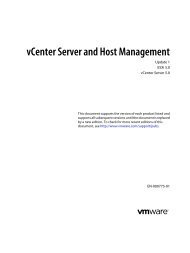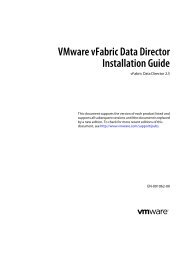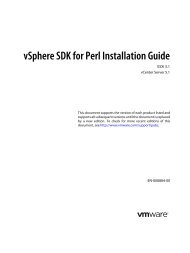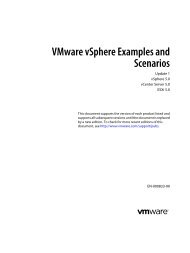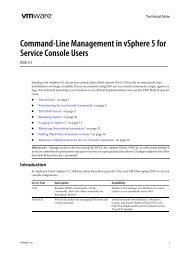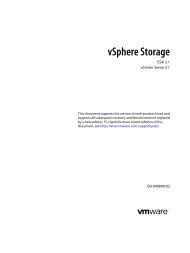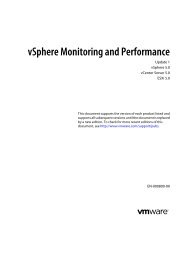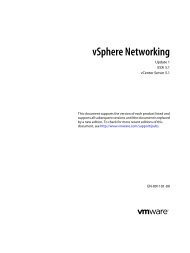Virtual Disk API Programming Guide - Documentation - VMware
Virtual Disk API Programming Guide - Documentation - VMware
Virtual Disk API Programming Guide - Documentation - VMware
You also want an ePaper? Increase the reach of your titles
YUMPU automatically turns print PDFs into web optimized ePapers that Google loves.
<strong>Virtual</strong> <strong>Disk</strong> <strong>Programming</strong> <strong>Guide</strong><br />
This function calls Vix<strong>Disk</strong>Lib_GetInfo() to determine the number of sectors allocated in the virtual disk.<br />
The number of sectors is available in the Vix<strong>Disk</strong>Lib<strong>Disk</strong>Info structure, but normally not in the metadata.<br />
With SPARSE type layout, data can occur in any sector, so this function reads all sectors, whether filled or not.<br />
Vix<strong>Disk</strong>Lib_Read() continues without error when it encounters an empty sector full of zeroes.<br />
The following difference list shows the remaining code changes necessary for adding the -virus option to the<br />
vix<strong>Disk</strong>LibSample.cpp sample program:<br />
43a44<br />
> #define COMMAND_VIRUS_SCAN (1 static void DoVirusScan(void);<br />
425a429<br />
> printf(" -virus: scan source vmdk for virus signature \n");<br />
519a524,525<br />
> } else if (appGlobals.command & COMMAND_VIRUS_SCAN) {<br />
> DoVirusScan();<br />
564a571,572<br />
> } else if (!strcmp(argv[i], "-virus")) {<br />
> appGlobals.command |= COMMAND_VIRUS_SCAN;<br />
Creating <strong>Virtual</strong> <strong>Disk</strong>s<br />
This section discusses the types of local VMDK files and how to create virtual disk for a remote ESX/ESXi host.<br />
Creating Local <strong>Disk</strong><br />
The sample program presented in Chapter 5 creates virtual disk of type MONOLITHIC_SPARSE, in other words<br />
one big file, not pre‐allocated. This is the default because modern file systems, in particular NTFS, support files<br />
larger than 2GB, and can hold more than 2GB of total data. This is not true of legacy file systems, such as FAT16<br />
on MS‐DOS and early Windows, or the ISO9660 file system for writing files on CD, or NFS version 2, or Linux<br />
kernel 2.4. All are limited to 2GB per volume. FAT and FAT32 were extended to 4GB in NT 3.51.<br />
However, a SPLIT virtual disk might be safer than the MONOLITHIC variety, because if something goes wrong<br />
with the underlying host file system, some data might be recoverable from uncorrupted 2GB extents. <strong>VMware</strong><br />
products do their best to repair a damaged VMDK, but having a split VMDK increases the chance of salvaging<br />
files during repair. On the downside, SPLIT virtual disk involves higher overhead (more file descriptors) and<br />
increases administrative complexity.<br />
When required for a FAT16 or early Linux file system, you can create SPLIT_SPARSE virtual disk. The change<br />
is simple: the line highlighted in boldface. The sample program could be extended to have an option for this.<br />
static void DoCreate(void)<br />
{<br />
Vix<strong>Disk</strong>LibAdapterType adapter = strcmp(appGlobals.adapterType, "scsi") == 0 ?<br />
VIXDISKLIB_ADAPTER_SCSI_BUSLOGIC : VIXDISKLIB_ADAPTER_IDE;<br />
Vix<strong>Disk</strong>LibCreateParams createParams;<br />
VixError vixError;<br />
createParams.adapterType = adapter;<br />
createParams.capacity = appGlobals.mbSize * 2048;<br />
createParams.diskType = VIXDISKLIB_DISK_SPLIT_SPARSE;<br />
vixError = Vix<strong>Disk</strong>Lib_Create(appGlobals.connection, appGlobals.diskPath, &createParams,<br />
NULL, NULL);<br />
CHECK_AND_THROW(vixError);<br />
}<br />
NOTE You can split VMDK files into smaller than 2GB extents, but created filenames still follow the patterns<br />
shown in Table 3‐1, “VMDK <strong>Virtual</strong> <strong>Disk</strong> Files,” on page 20.<br />
This one‐line change to DoCreate() causes creation of 200MB split VMDK files (200MB being the capacity set<br />
on the previous line) unless the -cap command‐line argument specifies otherwise.<br />
50 <strong>VMware</strong>, Inc.



